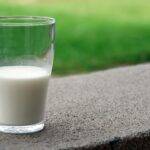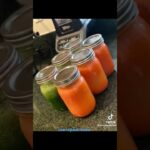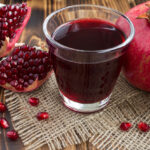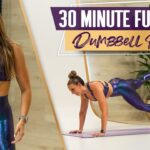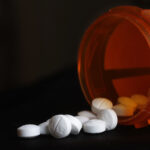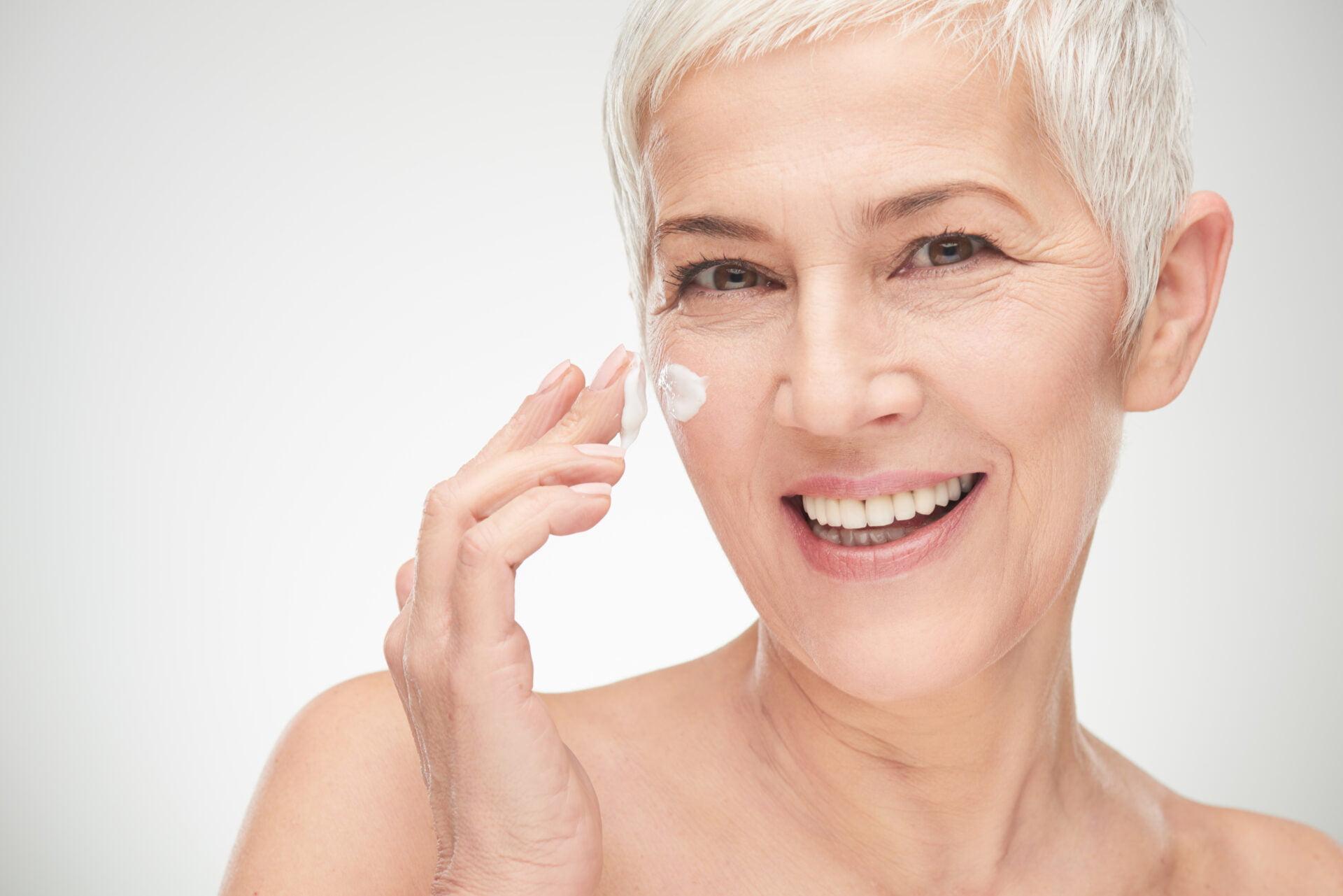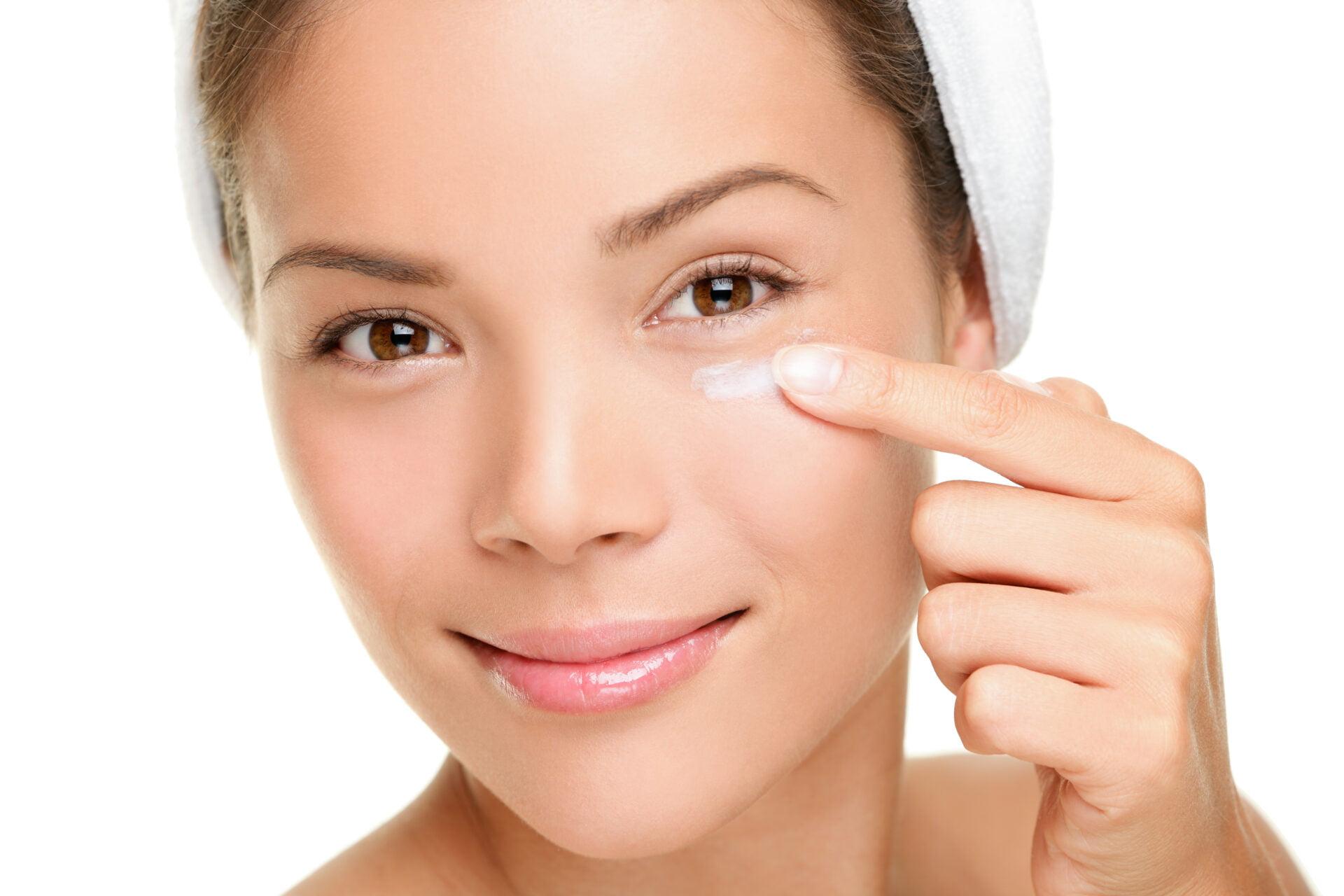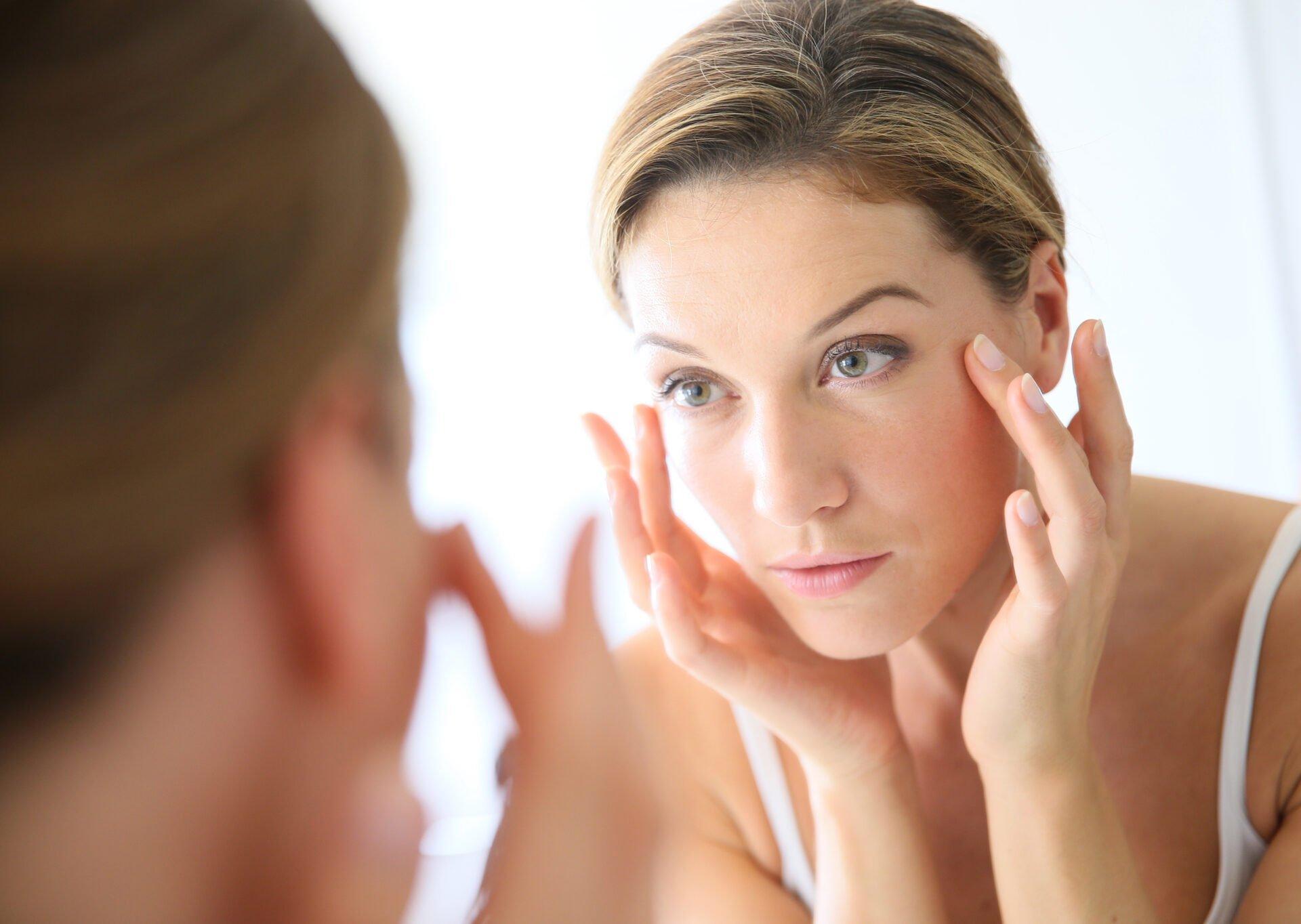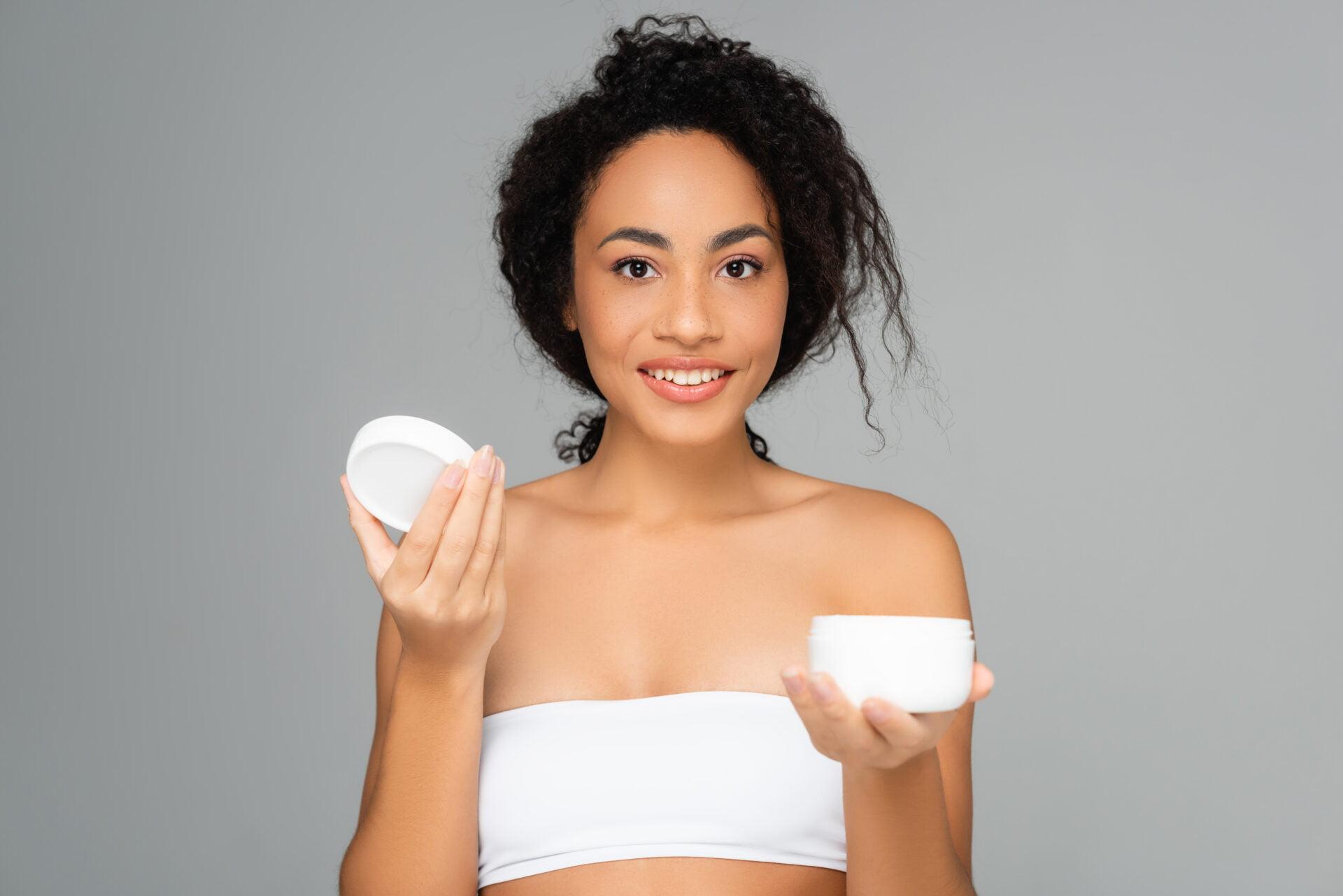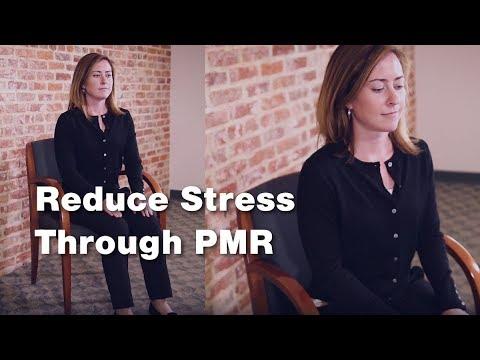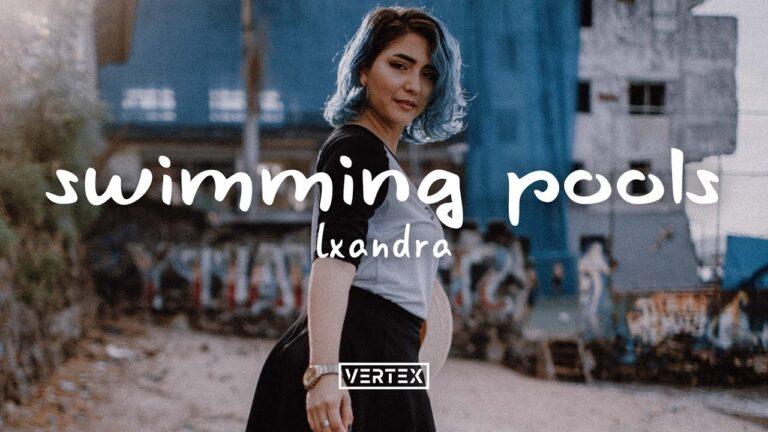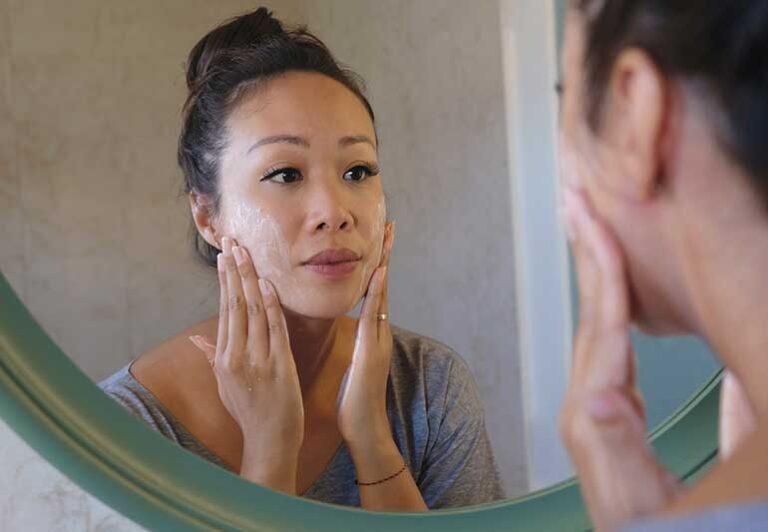
Are you looking for the best non-toxic anti-aging products to help you look and feel younger without all those pesky toxins? If that’s your goal, you’ve come to the right place. Mamavation evaluated over 80 products and ranked them based on ingredients to help make your non-toxic shopping easier. You’ve trusted Mamavation to bring you topics like best dental floss without PFAS “forever chemicals,” best non-toxic shampoo & conditioners, & best non-toxic peel-off facial masks, now join us for the best (& possibly worst) anti-aging creams (aka wrinkle cream) and eye lifting products to prevent signs of aging.
Disclosure: This post was medically reviewed by Sondra Strand, RN, BSN, PHN. This post also contains affiliate links.
The Anti-Aging Aisle is Full of Problematic Chemicals
As we get older, the skin on our neck and face begins to loosen up and part of that elasticity of youth disappears. This is when we start to see the appearance of fine lines, crow’s feet, and wrinkles forming around our eyes & mouth. While there are no magic creams that will get you looking like a teenager again, you can find safe non-toxic products that can reduce fine lines, hyperpigmentation, etc.
As Mamavation evaluated the ingredients of over 80 anti-aging beauty products, we noticed some issues with brands using ingredients that are linked to cancer, skin irritation, immune system problems, and other issues. Is that the price you have to pay to look younger? Absolutely not. There are plenty of products that use safer ingredients that we will introduce you to at the bottom of this investigation.
Chemicals to Avoid in Anti-Aging Creams
Go to your best drugstore and walk down those aisles and I bet you’ll find a myriad of anti-aging products recommended by board-certified dermatologists that have ingredients linked to skin irritation, cancers, and other types of problems. What is a girl to do? Well to start, here are some ingredients you want to avoid when you are browsing for that perfect anti-aging cream.
- Fragrance — “Fragrance” is either made from petroleum or botanical raw materials or both. It also contains ingredients like solvents, stabilizers, UV absorbers, preservatives, phthalates, and dyes. These types of chemicals vary in toxicity. But there is lots of mystery surrounding “fragrance” in personal care products. Companies that make perfume buy chemicals from other companies called “fragrance houses.” This means it is possible for a brand to not even know the fragrance chemicals inside their own product. However, as companies and states are moving toward fragrance ingredient disclosure, this is slowly starting to change. The biggest problem is the mystery because no one has any idea what is inside the word “fragrance.”
- Ethoxylated Ingredients — Ethoxylated ingredients are generally of low concern on their own. However, they can be contaminated with ethylene oxide, a known carcinogen, and 1,4- dioxane, reasonably anticipated to be a human carcinogen. They may also be linked to organ toxicity and reproduction toxicity.
- Polysorbates: Polysorbates are another type of ethoxylated ingredient we wanted to tell you about. They are widely used surfactants in biopharmaceutical formulations and also used as an emulsifier in cosmetic creams, lotions, & skin-aging creams, etc. In other words, it is used to help mix oil and water. Polysorbates are not problematic on their own, but when they used for cosmetic reasons, they are treated with ethylene oxide. Products treated with ethylene oxide frequently have traces of 1,4 dioxane which is a carcinogen.
- Harsh Preservative Combos — Although sodium benzoate and potassium sorbate are safer preservatives used by lots of natural products, when you combine them it’s excessive in personal care products. Our advisors do not recommend this specific mixture of preservatives.
- Sodium Laureth Sulfate and Sodium Lauryl Sulfate: SLS and SLES are surfactants. Even when naturally derived, they can be harmful. The Journal of the American College of Toxicology has shown that they can be an eye or skin irritant. There is also debate on whether or not SLS is a human carcinogen; other research indicates it may damage the environment. Both can be harmful to the environment.
- Formaldehyde Releasers: In personal care products, formaldehyde can be added directly to the product OR it can be released from preservatives inside the product. Chemicals that release formaldehyde over time are referred to as formaldehyde releasers. These chemicals prevent microbes from growing in water-based or aloe vera-based products, but are also linked to cancer and allergic skin reactions. Formaldehyde releasers are chemicals like quaternium-15, DMDM hydantoin, imidazolidinyl urea, diazolidinyl urea, polyoxymethylene urea, sodium hydroxymethylglycinate, 2-bromo-2-nitropropane-1,3-diol (bromopol) and glyoxal.
Chemicals That Enhance Other Chemicals
- Disodium EDTA: This chemical is not problematic on its own, but it’s important to know that it will increase the effect of other chemicals inside the formula. Disodium EDTA acts as a booster to enhance the absorption of the product. Therefore, when you see this chemical, look around at what else is inside the bottle. Disodium EDTA will make other chemicals absorb more efficiently into the skin.
- Alcohols: Alcohols are also another booster to enhance the absorption of the other chemicals in the products. So again, when you see alcohol, make sure you are also okay with the other ingredients. Alcohol will make the other chemicals absorb more efficiently into the skin.
Ingredients Found in Safe Anti-Aging Products
So what type of ingredients should you be looking for in safe anti-aging products? Here’s a list of the safest ingredients that you will find in most of the products we recommended below.
- Amino-peptides: carrier peptides, signal peptides, collagen-stimulating peptides, enzyme inhibitor peptides, or structural peptides
- Glycolic acid
- Hyaluronic Acid (or sodium hyaluronate)
- Shea butter
- Squalane
- Niacinamide
- Vitamin C
- Retinol (for those who do not have sensitive skin)
- Bakuchiol (similar to retinol but without the skin irritation)
Additional Mamavation Personal Care Investigations You May Love
Mamavation has ranked thousands of personal care products looking for hormone-disrupting chemicals, irritants, cancer-causing chemicals, and allergens. Here are some of the investigations we have done on other categories of personal care products:
Mamavation’s Investigation on Anti-Aging Creams & Products
Mamavation ranked over 80+ anti-aging products like wrinkle creams, peptide complexes, treatment oils, eye lifts, & firming gels. Products were separated into three categories: “Not our favorite,” better, & best categories. All categories are based on ingredients linked to hormone disruption, cancer, irritation, & organic toxicity.
Not Our Favorite Anti-Aging Creams & Products
These products were not our favorite because they contain some of all of the following ingredients: undisclosed fragrance or perfume, potential phthalates in formulation, ethoxylated ingredients, polysorbates, formaldehyde-releasing ingredients, parabens, SLS and SLES, etc. Basically, these were the formulations that contained the ingredients we warned you about above.
- Alcone Lifeline ProPlus Advanced Aqueous Treatment
- amala Youth-Renewing Powerhouse Face Cream
- Beauty Society Poker Face – Instant Crease & Wrinkle Relief Creme
- CeraVe Skin Renewing Night Cream Peptide Complex
- eb5 Intense Moisture Anti-Aging Cream
- Epionce Intensive Nourishing Cream
- Epionce Renewal Facial Cream
- Hydropeptide Power Lift Moisturizer
- IT Cosmetics Confidence In A Cream
- L’Occitane Immortelle Overnight Oil-In-Serum
- L’Occitane Immortelle Divine Creme
- La Roche Posay Redermic R Anti-Aging Concentrate Face Cream
- Loreal Age Perfect Night Moisturizer
- Luzern Creme Luxe
- Natura Bisse Essential Shock Intense Cream
- Nerium Night Cream
- Neutrogena Hydro Boost Water Gel Cream
- Neutrogena Rapid Wrinkle Repair Retinol Regenerating Cream
- NUXE Anti-Aging Nuxuriance Ultra Cream
- Olay Regenerist Retinol 24 Max Moisturizer
- Olay Regenerist Micro-Sculpting Cream
- Paula’s Choice RESIST Repair Cream
- PUR Botanicals Radiant Anti-Oxidant Moisture Creme
- RoC Retinol Correxion Line Smoothing Hydration Cream
- Trilogy Age-Proof Replenishing Night Cream
Better Anti-Aging Creams & Products
These products are better than the former products, but we still found some issues that you may want to consider in terms of overuse of “light” preservatives, non-transparent fragrance use, harsh fragrances that are linked to skin irritation, or had 1-2 problematic ingredients. It’s hard to formulate a good anti-aging cream, but these were the happy medium brands.
- Alpyn Beauty Triple-C Brightening Bounce Cream
- Amala Retexturizing Gel Aqua Peel
- Amala Youth-Renewing Powerhouse Face Cream
- Amala Illuminating Pro-Retinoic Treatment Oil
- Beautycounter Countertime Eye Cream
- BL+ The Cream
- Burt’s Bees Renewal Firming Moisturizing Cream
- Burt’s Bees Firming Eye Cream
- Derma-E Anti-Wrinkle Renewal Cream
- Dr. Haushka Regenerating Day Cream Intensive
- Eight Saints Up the Anti-Night Cream
- Eminence Coconut Age Corrective Moisturizer
- Eminence Firm Skin Acai Moisturizer
- First Aid Beauty Ultra Repair Firming Collagen Cream
- FLOWERSPICE Sooth & Repair Daily Moisturiser
- Goop GOOPGENES All-in-One Super Nutrient Face Oil
- Grown Alchemist Age-Repair Moisturiser
- Grown Alchemist Age-Repair Serum
- Josie Maran Whipped Argan Oil Face Butter
- Juice Beauty Stem Cellular Anti-Wrinkle Moisturizer
- Just The Goods Facial Moisturizer for Normal/Sensitive Skin
- Kora Turmeric Glow Moisturizer
- L’BRI Neck Firming Cream
- Lavido Age Away Night Cream
- Lemongrass Spa Overnight Ultra Lift Creme
- Nature Remedy Collagen Day & Night Anti-Aging Cream
- Naturopathica Argan & Peptide Advanced Wrinkle Remedy Water Cream
- Neal’s Yard Remedies Frankincense Intense Lift Cream
- Odacite Creme De La Nuit
- OSEA Advanced Repair Eye Cream
- Rhonda Allison Healthy Aging Cream
- Skin Alchemists Time Traveller Renewing Face Cream
- Tata Harper Repairative Moisturizer
- True Botanicals Chebula Extreme Cream
- Versed Dew Point Moisturizing Gel-Cream
Best Anti-Aging Creams & Products
These products had the least amount of problematic chemicals, if at all. Granted, this category is a difficult one to formulate so you may find that some of your favorite brands did not make this list.
- Acaderma Rejuvenating Rich Cream
- Acure Radically Rejuvenating Whipped Night Cream
- Acure Ultra Hydrating Overnight Dream Cream
- African Botanics Silver Rescue Cream
- Biosance Squalane + Copper Peptide Serum
- Biossance Squalane + Vitamin C Rose Moisturizer
- Blissoma Lift – Intelligent Energy Creme
- BLUH Alchemy Nocturnal Repair
- BLUH Alchemy Antioxidant Face Oil
- Crunchi Nightlight Evening Facial Cream
- Crunchi Goldenlight Multi-Peptide Serum
- Crunchi Daylight Facial Cream
- Crunchi Powerlift Eye Cream
- Elina Organic Ambra Lift Elixir
- Elina Organics Anti-Wrinkle Liposome Moisturizer
- Elina Organics Super Antioxidant Night Cream
- Goop GOOPGENES All-In-One Nourishing Face Cream
- Honest Hydrogel Cream
- Juice Beauty Signal Peptides Blam & Mask
- One Love Organics Botanical E Neck & Decollete Firming Cream
- OSEA Advanced Protection Cream
- Pure Haven Refresh Eye Cream
- Pure Haven Refresh Moisturizer
- Pure Haven Refresh Night Serum
- Pure Haven Soothing Serum
- Pure Haven Beauty Booster
- Ursa Major Golden Hour Recovery Cream
- Ursa Major Golden Hour Brighten Up Vitamin C Serum
- Votary Super Seed Nutrient Cream
- Willing Beauty SLEEPOVER Replenishing Night Cream
- Zizia Botanicals Moisturizing Flower Balm
The post Best (& Worst) Non-Toxic Anti-Aging Creams & Eye Lifting Products appeared first on MAMAVATION.
This content was originally published here.



